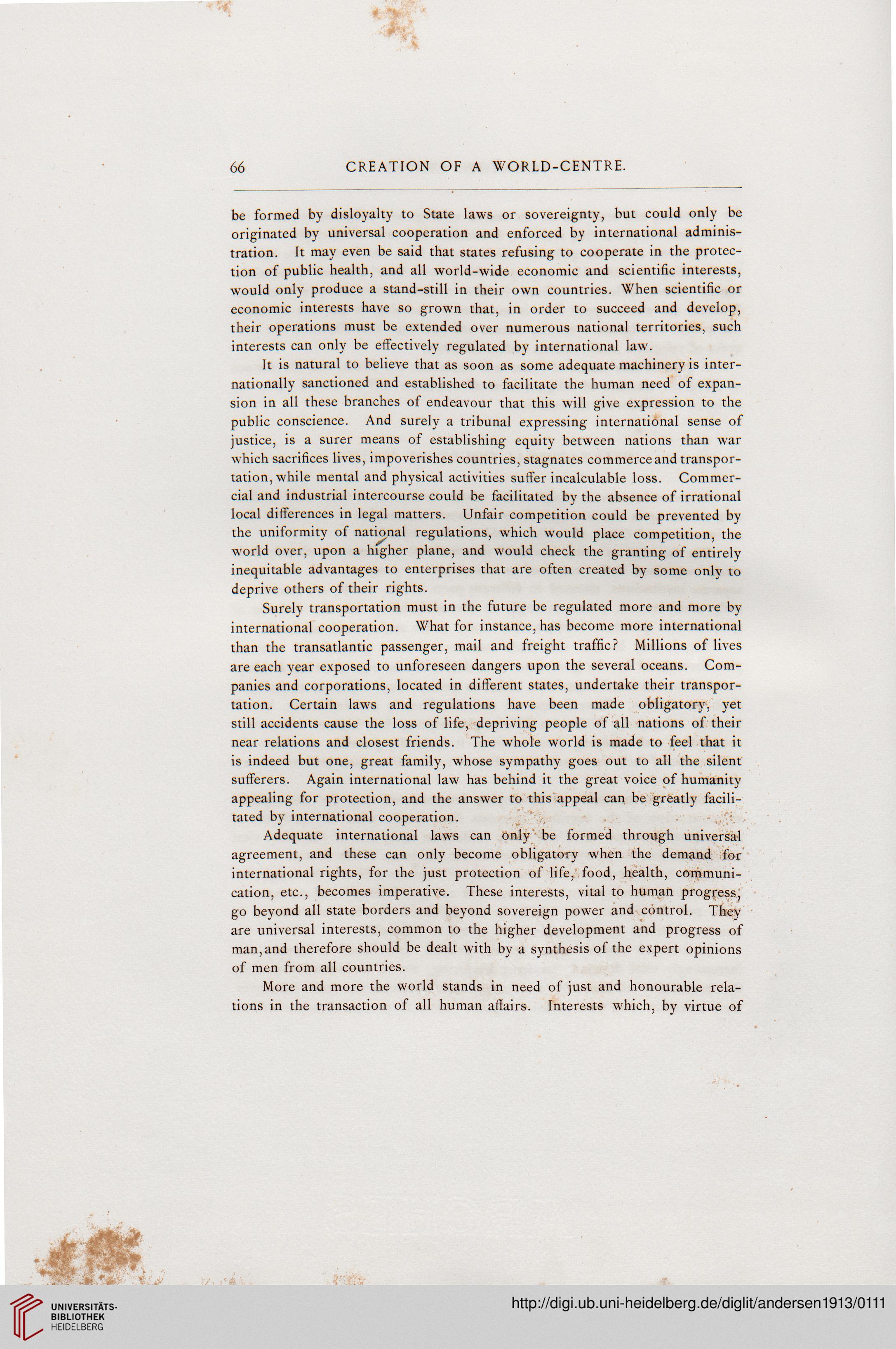66
CREATION OF A WORLD-CENTRE.
be formed by disloyalty to State laws or sovereignty, but could only be
originated by universal cooperation and enforced by international adminis-
tration. It may even be said that states refusing to cooperate in the protec-
tion of public health, and all world-wide economic and scientific interests,
would only produce a stand-still in their own countries. When scientific or
economic interests have so grown that, in order to succeed and develop,
their operations must be extended over numerous national territories, such
interests can only be effectively regulated by international law.
It is natural to believe that as soon as some adequate machinery is inter-
nationally sanctioned and established to facilitate the human need of expan-
sion in all these branches of endeavour that this will give expression to the
public conscience. And surely a tribunal expressing international sense of
justice, is a surer means of establishing equity between nations than war
which sacrifices lives, impoverishes countries, stagnates commerce and transpor-
tation, while mental and physical activities suffer incalculable loss. Commer-
cial and industrial intercourse could be facilitated by the absence of irrational
local differences in legal matters. Unfair competition could be prevented by
the uniformity of national regulations, which would place competition, the
world over, upon a higher plane, and would check the granting of entirely
inequitable advantages to enterprises that are often created by some only to
deprive others of their rights.
Surely transportation must in the future be regulated more and more by
international cooperation. What for instance, has become more international
than the transatlantic passenger, mail and freight traffic? Millions of lives
are each year exposed to unforeseen dangers upon the several oceans. Com-
panies and corporations, located in different states, undertake their transpor-
tation. Certain laws and regulations have been made obligatory, yet
still accidents cause the loss of life, depriving people of all nations of their
near relations and closest friends. The whole world is made to feel that it
is indeed but one, great family, whose sympathy goes out to all the silent
sufferers. Again international law has behind it the great voice of humanity
appealing for protection, and the answer to this appeal can be greatly facili-
tated by international cooperation.
Adequate international laws can only be formed through universal
agreement, and these can only become obligatory when the demand for
international rights, for the just protection of life, food, health, communi-
cation, etc., becomes imperative. These interests, vital to human progress,
go beyond all state borders and beyond sovereign power and control. They
are universal interests, common to the higher development and progress of
man,and therefore should be dealt with by a synthesis of the expert opinions
of men from all countries.
More and more the world stands in need of just and honourable rela-
tions in the transaction of all human affairs. Interests which, by virtue of
CREATION OF A WORLD-CENTRE.
be formed by disloyalty to State laws or sovereignty, but could only be
originated by universal cooperation and enforced by international adminis-
tration. It may even be said that states refusing to cooperate in the protec-
tion of public health, and all world-wide economic and scientific interests,
would only produce a stand-still in their own countries. When scientific or
economic interests have so grown that, in order to succeed and develop,
their operations must be extended over numerous national territories, such
interests can only be effectively regulated by international law.
It is natural to believe that as soon as some adequate machinery is inter-
nationally sanctioned and established to facilitate the human need of expan-
sion in all these branches of endeavour that this will give expression to the
public conscience. And surely a tribunal expressing international sense of
justice, is a surer means of establishing equity between nations than war
which sacrifices lives, impoverishes countries, stagnates commerce and transpor-
tation, while mental and physical activities suffer incalculable loss. Commer-
cial and industrial intercourse could be facilitated by the absence of irrational
local differences in legal matters. Unfair competition could be prevented by
the uniformity of national regulations, which would place competition, the
world over, upon a higher plane, and would check the granting of entirely
inequitable advantages to enterprises that are often created by some only to
deprive others of their rights.
Surely transportation must in the future be regulated more and more by
international cooperation. What for instance, has become more international
than the transatlantic passenger, mail and freight traffic? Millions of lives
are each year exposed to unforeseen dangers upon the several oceans. Com-
panies and corporations, located in different states, undertake their transpor-
tation. Certain laws and regulations have been made obligatory, yet
still accidents cause the loss of life, depriving people of all nations of their
near relations and closest friends. The whole world is made to feel that it
is indeed but one, great family, whose sympathy goes out to all the silent
sufferers. Again international law has behind it the great voice of humanity
appealing for protection, and the answer to this appeal can be greatly facili-
tated by international cooperation.
Adequate international laws can only be formed through universal
agreement, and these can only become obligatory when the demand for
international rights, for the just protection of life, food, health, communi-
cation, etc., becomes imperative. These interests, vital to human progress,
go beyond all state borders and beyond sovereign power and control. They
are universal interests, common to the higher development and progress of
man,and therefore should be dealt with by a synthesis of the expert opinions
of men from all countries.
More and more the world stands in need of just and honourable rela-
tions in the transaction of all human affairs. Interests which, by virtue of





